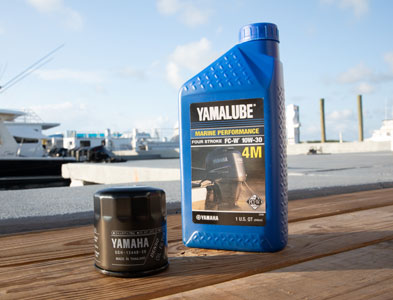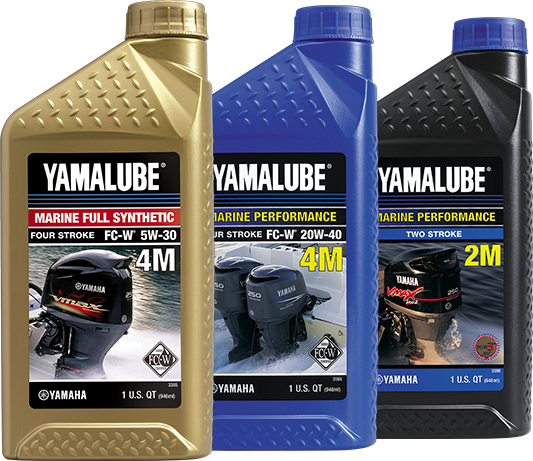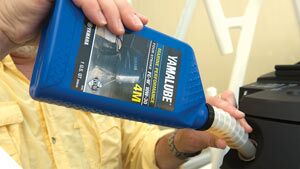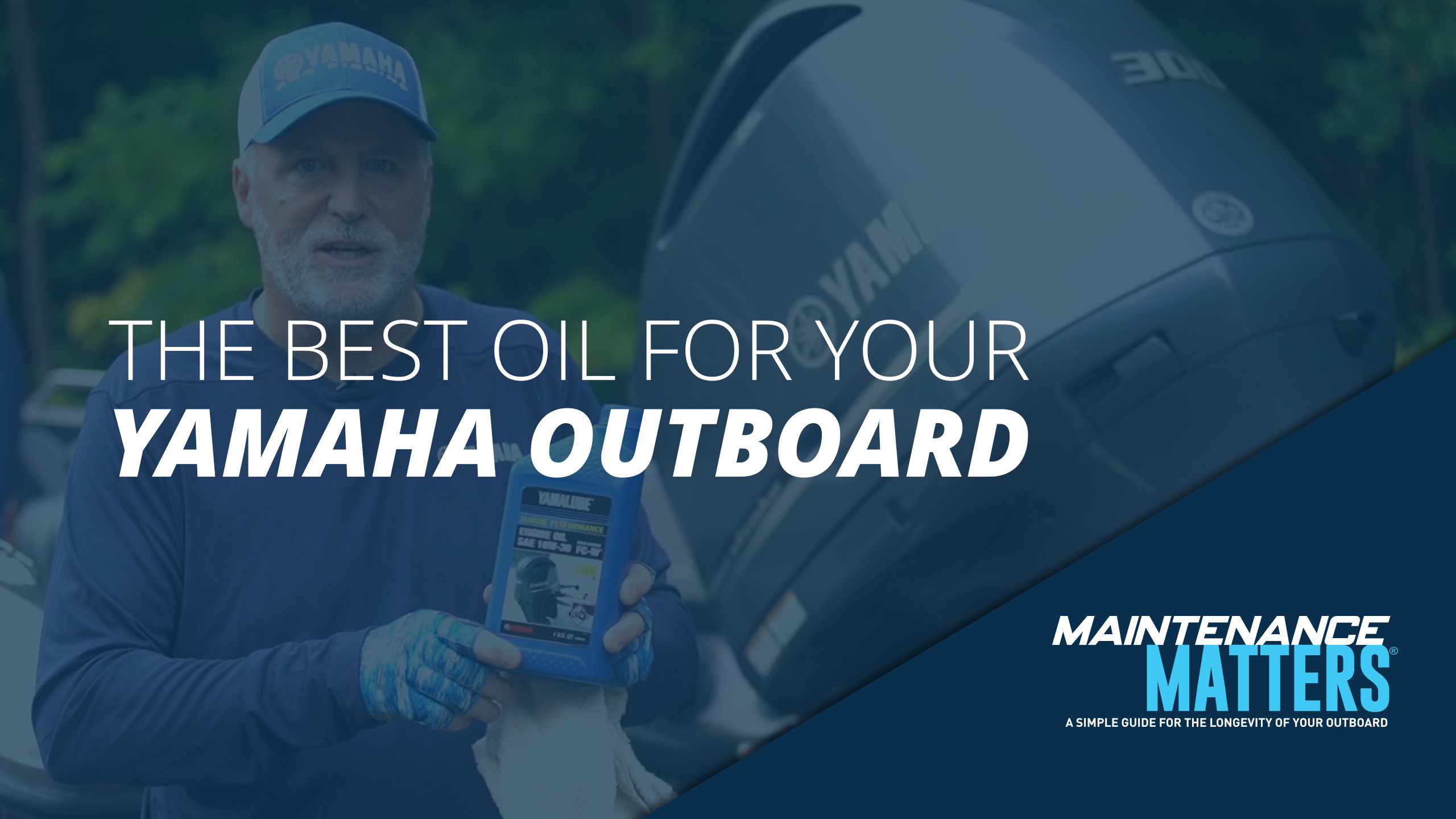Engine Oil & Lube
PICKING THE BEST PROTECTION
You’ve heard the expression “choose wisely.” When it comes to choosing an engine oil and filter to protect your Yamaha, this couldn’t be more true.
Using the correct oil and filter at the recommended intervals is the single most important thing you can do for your outboard.

Do It Yourself
But if you prefer to do it yourself, your Yamaha Marine dealer can set you up with a Genuine Yamalube Oil Change Kit, specific to your Yamaha outboard. It includes the right type and amount of Yamalube marine oil, a Genuine Yamaha oil filter and a drain gasket. Everything you’ll need to do the job right. Kits are available in Yamalube 4M 10W-30 and 20W-40 weights.
- Start and warm the outboard to normal operating temperature, then shut it off.
- Tilt engine up halfway and allow to rest for 5 minutes to thoroughly drain the oil back into your outboard’s crankcase.
- Trim the outboard back down to level. You can place a small level on top of the anti-ventilation plate to help you determine when to stop.
- Pull the dipstick, wipe the oil from it and re-insert it in the crankcase. Then pull the stick again and check the oil level. This helps ensure proper venting for accurate indication.
- At the proper oil level, the oil should be halfway up crosshatch pattern on the dipstick.
Tip: The top and bottom of the crosshatch pattern on the dipstick do not represent “high” and “low.” The correct oil level indication is at the mid-point of the pattern. Use caution when filling or adding oil. Yamaha 4-stroke outboards have a tapered oil sump design (smaller at the top than the bottom), so the closer the oil level is to full, the faster it fills.
Therefore, add oil slowly and in small amounts, and do not attempt to “top off.” Do not allow the oil level to surpass the upper portion of the crosshatch pattern. Doing so may result in aeration of the oil, reducing lubricity and oil pressure, and may cause eventual engine damage.

USE MARINE PERFORMANCE OIL
- Marine Oils
Avoid Automotive Oil
Your Yamaha outboard is vastly different from your automotive engine, so avoid regular automotive engine oils. Use a motor oil specifically formulated for the rigors of the marine environment, like Yamalube® 4M for 4-stroke outboards, and Yamalube® 2M for two-stroke outboards.
NMMA-Certified Oil
Marine engine oils are so different in their requirements that special levels of certification exist: FC-W® (4 stroke) and TC-W3® (2 stroke). These represent the minimum standards of the National Marine Manufacturer’s Association (NMMA®) for marine engines.
With their high quality and advanced formulations, all Yamalube 4M and 2M oils meet or surpass all of these requirements. Using Yamalube is best for your Yamaha outboard, but whatever outboard motor oil you choose, make sure it is the correct type and viscosity and that it carries either the NMMA® FC-W® or TC-W3® label. - Engine Load & Speed
Higher Engine Load & Speed
The typical loads placed on your outboard are much heavier than on your automobile, having to overcome a much greater amount of drag to create performance. This means your outboard is working much harder than your automobile’s engine. Yamalube 4M and 2M marine engine oils contain specific anti-wear additives to account for this.
Your outboard also operates at a much higher RPM than your automobile’s engine. It must rev higher to create higher speeds, rather than just changing gears like your car. That means your outboard may run all day long at 4500-6000 RPM, rather than the 2500 RPM your car reaches at highway speeds.
That’s tough on your oil, and it can literally shear (or split) the molecules in ordinary automotive oil, reducing lubricity. Yamalube 4M and 2M have special shear-stable polymers to combat this and provide superior lubrication at all times. - Operating Environment
Operating Temperature & Environment
Outboards are cooled using raw water, which is often cool to very cold. On the other hand, saltwater will begin to crystallize if its temperature is raised above 170° F, potentially causing blockage in the cooling passages and leading to engine overheat and possible damage. Because of these two factors, your outboard operates full-time at a temperature much lower that your automobile, and requires very different qualities in its lubricating oil. Yamalube marine oils have detergents, dispersants and viscosity index improvers to meet these marine-specific challenges head-on.
Your outboard is constantly near water, sucking in very humid air directly off the water’s surface to operate. This humid air also gets inside combustion chambers through open valves when it’s not in use.
And in a saltwater environment, that air is even more corrosive. It’s one of the harshest environments imaginable for an engine. Yamalube 4M and 2M are purposely formulated with special anti-corrosion agents to help combat and prevent the corrosive effects of this environment.
Yamalube outboard engine oils provide specific protection other boat motor oils don’t, using a proprietary blend of marine-specific anti-wear additives, shear-stable polymers, corrosion inhibitors, detergents, dispersants and viscosity index improvers. In short, they’re far superior to automotive engine oils in their strength of protection, durability and corrosion resistance.
CHOOSE YAMALUBE®
 Yamalube 4M FC-W® is reformulated to better protect your investment from the harsh effects of cold starts, hours of trolling and high-load, high-speed operation. Its special anti-corrosive additives are particularly suited for the harsh marine environment.
Yamalube 4M FC-W® is reformulated to better protect your investment from the harsh effects of cold starts, hours of trolling and high-load, high-speed operation. Its special anti-corrosive additives are particularly suited for the harsh marine environment.
- 5W-30 Full-Synthetic—great for high-performance outboards like our V MAX SHO® model
- 10W-30 Mineral Base (conventional)—ideal for all Yamaha outboards and environments
- 20W-40 Mineral Base (conventional)—suited for large outboards in consistently warm climates
Tip: Your owner’s manual is the best place to look for your recommended viscosity.
Yamalube 2M TC-W3® is Yamaha-formulated and NMMA®-approved. It provides outstanding protection for 2-stroke, water-cooled outboards, with its special blend of additives that help combat ring stick, corrosion, varnish and wear. It’s a standard by which other 2-stroke oils are judged.
.png) Outwardly, oil filters may appear the same. But it’s what’s on the inside that counts most. Yamaha oil filters are manufactured specifically to protect Yamaha engines, using only the finest components and construction methods available.
Outwardly, oil filters may appear the same. But it’s what’s on the inside that counts most. Yamaha oil filters are manufactured specifically to protect Yamaha engines, using only the finest components and construction methods available.This includes a special filter media and metal filter media bases (instead of cardboard), to help them achieve a level of durability and filtration far superior than most “off-the-shelf” oil filters. From the quality of the materials used to their high-quality construction, they simply outperform and out-protect most aftermarket alternatives.
Videos

The Best Oil for your Yamaha Outboard

Fogging Engine | Maintenance Matters

Y.E.S Program | Maintenance Matters
Your boat and outboard at your fingertips.
 The Siren Connected Boat App
The Siren Connected Boat App
Dealer-completed service. DIY maintenance. Track it all with the Siren Connected Boat app. It puts a full maintenance history at your fingertips. Plus, you can remotely monitor and control critical boat systems and security, and more when properly equipped.
